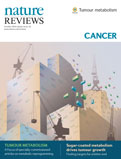Advertisement |
 |
Determine the Metabolic Phenotype of Your Cells
The Agilent Seahorse XF Cell Energy Phenotype Test uses as few as 15,000 cells, and the Agilent Seahorse XFp Analyzer, to identify your cells' metabolic phenotype, as well as their metabolic potential — the relative utilization of mitochondrial respiration and glycolysis.
http://bit.ly/1Caw9Eq |  | |
 |
 |
| |
| TABLE OF CONTENTS |
 |
| |
| October 2016 Volume 16 Number 10 | Advertisement
|
| Impact Factor 34.244 * | In this issue
  Foreword Foreword
  Research Highlights Research Highlights
  Focus on: Tumour metabolism Focus on: Tumour metabolism
  Reviews Reviews
| Nature Reviews Cancer Focus on Tumour Metabolism
This Focus explores the dynamic and varied metabolism in tumour cells, discussing the importance of these pathways for many tumorigenic processes, such as tumour progression, survival, growth, epigenetic changes and how these can be translated to the clinic.
Access the Focus free online.
Produced with support from
Agios Pharmaceuticals, Inc. | |
|
|
 |
| Advertisement |
 |
Working at Roche in Switzerland
We're looking for committed scientists who share our passion to make a difference for millions of patients. Learn more |  | |
 |
| |
| Advertisement |
 |
The Department of Oncology and Inflammation Research in South San Francisco is seeking scientists to investigate mechanisms of immune mediated pathogenesis in cancer, autoimmunity, and inflammatory diseases, and to discover and develop innovative therapies and approaches to treat these diseases.
Sr Assoc Scientist: R-26213; Scientist: R-13078, R-27571 and
R-24894; Sr Scientist: 33977BR and R-13247.
Click here for more |  | |
 |
| |
| Advertisement |
 |
Open for Submissions
npj Precision Oncology is a new open access, online-only, peer-reviewed journal committed to publishing cutting-edge scientific research in all aspects of precision oncology from basic science to translational applications, to clinical medicine. The journal is part of the Nature Partner Journals series and published in partnership with The Hormel Institute, University of Minnesota.
Explore the benefits of submitting your manuscript >> |  | |
 |
| |
 |
| |
FOREWORD
| Top |
The current state of cancer metabolism
Rob A. Cairns & Tak W. Mak
p613 | doi:10.1038/nrc.2016.100
This Foreword introduces the nine Review articles in our Focus on Tumour Metabolism and discusses the main areas of tumour metabolism for further research.
Abstract | Full Text | PDF
|
|
 |
| Advertisement |
 |
Understanding protein fate: Your protein is affected by ubiquitin - ask us how. LifeSensors has pioneered tools and services for researchers from basic research to drug discovery. Whether you're new to the field or you're a seasoned expert, we can help. |  | |
 |
 |
|
 Focus on: Tumour metabolism Focus on: Tumour metabolism | | REVIEWS | Top | From Krebs to clinic: glutamine metabolism to cancer therapy
Brian J. Altman, Zachary E. Stine & Chi V. Dang
p619 | doi:10.1038/nrc.2016.71
This Review provides an overview of glutamine metabolism and its involvement in tumorigenesis in vitro and in vivo, exploring the recent potential applications of basic science discoveries in the clinical setting.
Abstract | Full Text | PDF
| Reprogramming glucose metabolism in cancer: can it be exploited for cancer therapy?
Nissim Hay
p635 | doi:10.1038/nrc.2016.77
The reprogramming of glucose metabolism in cancer cells, which have increased flux through glycolysis and related pathways, offers the promise of targeted inhibitors to selectively eradicate cancer cells either by themselves or as adjuvants to existing therapeutic modalities.
Abstract | Full Text | PDF
| Serine and one-carbon metabolism in cancer
Ming Yang & Karen H. Vousden
p650 | doi:10.1038/nrc.2016.81
Serine supports many biosynthetic pathways, including the one-carbon cycle. This Review discusses how cancer cells acquire and use serine, and explores novel therapeutic approaches to limit serine metabolism.
Abstract | Full Text | PDF
| Oxygen availability and metabolic adaptations
Michael S. Nakazawa, Brian Keith & M. Celeste Simon
p663 | doi:10.1038/nrc.2016.84
The availability of oxygen and nutrients changes during tumour evolution, which can have an effect on gene expression and diverse metabolic reactions as cells try to adapt to the new environment. In this Review the authors summarize how these metabolic adaptations are integrated in hypoxic tumour cells and their role in disease progression.
Abstract | Full Text | PDF
|
|
|
|
|
| Advertisement |
 |
Therapeutic approaches to enhance natural killer cell cytotoxicity: the force awakens
This Poster discusses the growing armamentarium of Natural Killer cell based anticancer approaches and provides an overview of the strategies and agents in preclinical and clinical research.
Download the Poster free online
Produced with support from Lonza Bioscience Solutions | | |
 |
| |
|
|
|
| Advertisement |
 |
Established as a sister journal of Cell Research, Cell Discovery is a fully open access journal publishing original articles and reviews on results of significance and originality in all areas of molecular and cell biology.
Submit your manuscript. |  | |
 |
| |
 |  |  |  |  |  | Natureevents is a fully searchable, multi-disciplinary database designed to maximise exposure for events organisers. The contents of the Natureevents Directory are now live. The digital version is available here.
Find the latest scientific conferences, courses, meetings and symposia on natureevents.com. For event advertising opportunities across the Nature Publishing Group portfolio please contact natureevents@nature.com |  |  |  |  |  |
|











No comments:
Post a Comment